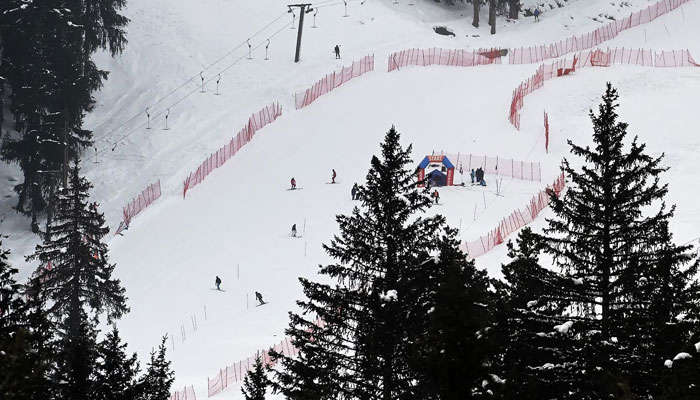Climate change threat looms large over future of winter sports
GDANSK: Pietro Casartelli started alpine skiing at the age of two with the dream of becoming a professional athlete and racing in the sport’s World Cup.
Now 18, the Italian says climate change is making his goals harder and much more expensive to achieve. Warming weather systems and a shorter season are threatening winter sports and testing the resolve of professionals and amateurs alike. “If we keep having seasons like this one, we’ll have to stop,” said Josiane Sempe, owner of a ski rental store in the Hautacam resort, at the border of France and Spain in the Pyrenees. “I think this year is compromised.”
Casartelli signed up last year for a training camp in Chile, where the southern hemisphere winter provides snow on the Andes mountains, one of the few destinations available to athletes for training during Europe’s hottest months as record heat affects even the continent’s highest glaciers. “We have to make do, even if we can’t always train at our best,” he told Reuters on his way back from a competition in central Italy.
His trip to Chile was cancelled as too few of the participants could afford it. Simona Novara, spokesperson of the Sestriere Ski Club which Casartelli represents, said the month-long training can cost up to 8,000 euros ($8,700) per athlete.
Climate change is making alpine skiing an elite sport in Europe, as winter training venues are declining in number, while high altitude summer pistes have almost disappeared, Novara said. An International Biathlon Union (IBU) survey shows that some 60% of athletes in the sport which combines skiing and shooting have felt the impact of climate change, affecting training and competition conditions.
The IBU told Reuters that technical snowmaking capability is a requirement for any high-level licensed IBU biathlon venue to run events even in warmer temperatures, like those in the 2024 world championships in Nove Mesto, Czech Republic.
In Chamonix, France, a historic comeback victory by Switzerland’s Daniel Yule at the men’s World Cup slalom was aided by melting snow, climatologist Mark Maslin said.
Climate change-related weather anomalies are also becoming commonplace and forcing events to be cancelled, with unpredictable weather an even bigger challenge to winter sports than rising temperatures, said Susanna Sieff, the sustainability director of the International Ski Federation (FIS). “Storms of the century are being seen now every four to five years,” she said.
The FIS had to cancel two ski races in Germany and France this month, while the Snowboard World Cup faced a massive storm in Mammoth, California which brought record snowfall.
As the 2026 Cortina-Milan Winter Olympics approach, concerns mount that climate change will threaten the competition. “By mid-century, there will remain practically just 10-12 NOCs (National Olympic Committees) who could host these snow events,” the International Olympic Committee (IOC) website quoted its President Thomas Bach as saying in October.
The Hautacam resort has around 20 pistes and in January it rebranded itself the “Hautacam Plage” on social media channels, showing deckchairs and barbecues instead of white slopes and hot chocolate. “Will this become the only recipe for our resort in winter? I don’t know, it’s a difficult question to answer,” said Marie-Florentine Hulin, the resort’s communications and marketing manager.
France’s public audit office warned this month that the economic model for the country’s ski resorts was running out of steam in the face of climate change and that most resorts were likely to be affected by 2050, with areas south of the Alps hit hardest.
“The snow situation is likely to get worse. So we might as well adapt ourselves to this and find other activities in the nature, such as cycling or hiking,” said Stephane Remy, a Hautacam guest.
-
 Jerome Tang Calls Out Team After Embarrassing Home Defeat
Jerome Tang Calls Out Team After Embarrassing Home Defeat -
 Cynthia Erivo Addresses Bizarre Rumour About Her Relationship With Ariana Grande
Cynthia Erivo Addresses Bizarre Rumour About Her Relationship With Ariana Grande -
 Prince Harry, Meghan Markle Spotted Cosying Up At NBA All-Star Game
Prince Harry, Meghan Markle Spotted Cosying Up At NBA All-Star Game -
 Lady Gaga Explains How Fibromyalgia Lets Her 'connect With People Who Have It'
Lady Gaga Explains How Fibromyalgia Lets Her 'connect With People Who Have It' -
 Metro Detroit Weather Forecast: Is The Polar Vortex Coming Back?
Metro Detroit Weather Forecast: Is The Polar Vortex Coming Back? -
 Daniel Radcliffe Reveals Surprising Way Fatherhood Changed Him
Daniel Radcliffe Reveals Surprising Way Fatherhood Changed Him -
 ‘Disgraced’ Andrew At Risk Of Breaking Point As Epstein Scandal Continues
‘Disgraced’ Andrew At Risk Of Breaking Point As Epstein Scandal Continues -
 Alan Cumming Shares Plans With 2026 Bafta Film Awards
Alan Cumming Shares Plans With 2026 Bafta Film Awards -
 OpenClaw Founder Peter Steinberger Hired By OpenAI As AI Agent Race Heats Up
OpenClaw Founder Peter Steinberger Hired By OpenAI As AI Agent Race Heats Up -
 Kate Middleton's Reaction To Harry Stepping Back From Royal Duties Laid Bare
Kate Middleton's Reaction To Harry Stepping Back From Royal Duties Laid Bare -
 Rose Byrne Continues Winning Streak After Golden Globe Awards Victory
Rose Byrne Continues Winning Streak After Golden Globe Awards Victory -
 Ice Hockey Olympics Update: Canada Stays Unbeaten With Dominant Win Over France
Ice Hockey Olympics Update: Canada Stays Unbeaten With Dominant Win Over France -
 Brooklyn Beckham Makes This Promise To Nicola Peltz Amid Family Feud
Brooklyn Beckham Makes This Promise To Nicola Peltz Amid Family Feud -
 Chinese New Year Explained: All You Need To Know About The Year Of The Horse
Chinese New Year Explained: All You Need To Know About The Year Of The Horse -
 Canadian Passport Holders Can Now Travel To China Visa-free: Here's How
Canadian Passport Holders Can Now Travel To China Visa-free: Here's How -
 Maya Hawke Marries Christian Lee Hutson In New York Ceremony
Maya Hawke Marries Christian Lee Hutson In New York Ceremony




